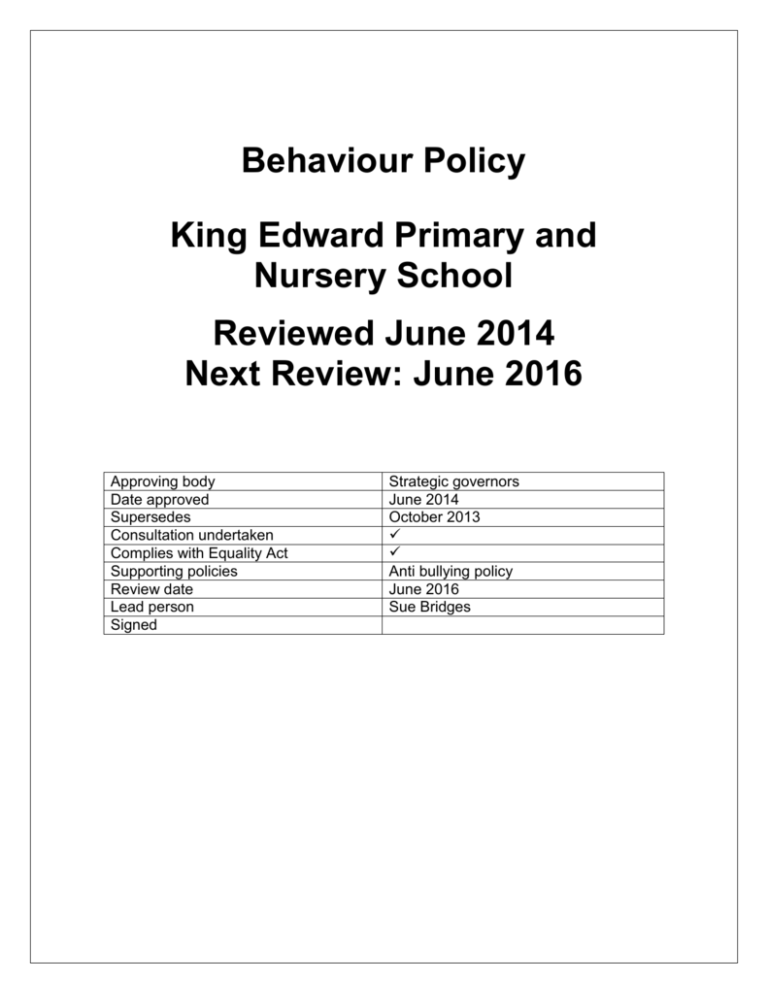Behaviour Policy - Amazon Web Services
advertisement

Behaviour Policy King Edward Primary and Nursery School Reviewed June 2014 Next Review: June 2016 Approving body Date approved Supersedes Consultation undertaken Complies with Equality Act Supporting policies Review date Lead person Signed Strategic governors June 2014 October 2013 Anti bullying policy June 2016 Sue Bridges Behaviour Policy KING EDWARD PRIMARY SCHOOL AND NURSERY Behaviour Policy King Edward Primary School and Nursery wants to be recognised as a school at the heart of the community, providing an inclusive, safe, caring and stimulating environment in which to learn. The entire staff at King Edward School has the goal of establishing an atmosphere throughout the school in which children will feel safe, secure and happy and, in addition, will have the maximum opportunity to learn. We are particularly concerned with the way that children behave towards each other and towards all adults, both in and out of class. Good behaviour is a necessary condition for effective learning and teaching to take place. We feel that children learn best when they know exactly what is expected of them. It is also very important to us that the curriculum is interesting, relevant and fun! If children are enjoying what they do, they behave well. To help children know what is expected of them we have developed a whole school consistent policy. This plan centres on our “King Edward Rules”. The popular King Ed mascot is very visible around the school to remind children of our school rules and expectations. What are the King Edward Rules? ONE SCHOOL….ONE RULE At King Edward we care for ourselves, each other, our school and our community. Respect (for ourselves, our classmates, our teachers, and our property) KEPS/Policies/2013-2014/Behaviour Policy 2 Review June 2014 Behaviour Policy Understanding (of the feelings of those around us and our place in school and the wider community) Learning (by taking the opportunities that are given to us) Enjoyment (of all our time at King Edwards) Succeeding (in all we try to do) How can the King Edward Rules be realised? These rules can be realised through GOOD BEHAVIOUR. What can children do? Learn what good behaviour means Learn to care for one another Learn to make friends Learn to feel good about themselves Learn to do as well as possible in their school work What can the adults in school do? Meet the needs of all children Meet and get to know the parents Listen to children and parents Praise good behaviour and let parents know about it. Deal with children calmly and quietly Set a good example Encourage self-discipline REWARD children for behaving well Encourage the children to do their best work at all times. What can parents do? Ensure that children get an adequate amount of sleep because tired children cannot learn and are easily irritated. Feel free to come into school and discuss their children’s progress at a mutually convenient time. Support their children and the school. Listen to their children and talk to them. Sign the Home School Agreement KEPS/Policies/2013-2014/Behaviour Policy 3 Review June 2014 Behaviour Policy The King Edward Rules can also be realised by the use of POSITIVE REWARDS. Children who behave appropriately will be rewarded with praise and positive feedback. This is a high priority in school where good behaviour is recognised! We aim to emphasise this positive aspect and minimize the amount of time we spend in being negative and critical. What rewards do we have in school? Verbal praise, for example, “Well done” and “Thank you” Approving gestures such as a smile or a clap. Assemblies such as ‘King Ed’s Superstars’ celebrate good behaviour. Merits. These are awarded when children demonstrate appropriate behaviour such as politeness or careful listening and choose to obey the rules. They are also awarded for outstanding work and effort. These are marked and recorded on a class list by the teacher. Certificates are awarded when children collect 50, 100 and 150 or more merits. There is a class merit draw each week on Friday with special prizes. The more merits each child has gained, the greater their chance of winning. The 5 children in each class who have the most merits at the end of each half term will have a special treat with the head teacher to celebrate their good behaviour. Golden time is a very special time during the week where the children choose favourite activities to do. (In KS2 this is called TGI Friday-Thank goodness it’s Friday). The King Edward Primary School rules can be realised by the use of SANCTIONS. If a pupil chooses to break one of the King Edward Rules the following sequence of sanctions is applied: KEPS/Policies/2013-2014/Behaviour Policy 4 Review June 2014 Behaviour Policy Sanction 1 The child is given a verbal reminder of the rule Sanction 2 The child is given a ‘stop and think’ card. Sanction 3 The child has to miss a playtime. If this happens twice in the week, they then miss the whole of the TGI session in KS2. In KS1, the child after missing the first playtime, may move onto missing a second playtime and 5 minutes of Golden Time. Where the third sanction has been applied the class teacher will record the incident and send a slip home to inform parents. The sanctions work on a session basis so that the children are provided with a fresh start each session. The child has a chance to earn back their Golden Time/TGI treat by being issued with a report card to be signed by class teacher and can volunteer for community service. They then report to the deputy head teacher who decides whether they have shown enough effort and remorse to have their treat returned. Acts of physical assault are taken very seriously and are recorded in an incident book to act as a monitoring tool. If a child is named in the book as a perpetrator, then the parents will be informed by telephone by the head teacher, or her deputy, and the child automatically misses a playtime. If the child commits a second offence in the half term then, again, the head teacher will telephone parents and the child will be isolated at playtimes until the head teacher feels the child can be trusted to be allowed out to play. However, in cases of persistent bad behaviour or where serious misdemeanours have been committed (such as verbal or physical abuse of other children or adults) the Head Teacher will invite parents to a meeting to discuss ways in which the pupil’s behaviour could be improved. For serious misdemeanours, e.g. violence, swearing, stealing etc, a child may go straight to Sanction 3. In line with DFE guidance from central Government, staff may intervene using reasonable force with pupils when there is a risk to self, others or property, or when there is an issue of discipline or control. Actions of staff must be in line with the General Teaching Council’s code of conduct and practices. We regard it as good practice to inform parents about the use of force but it is not required to gain consent. KEPS/Policies/2013-2014/Behaviour Policy 5 Review June 2014 Behaviour Policy A child who persistently goes to sanction 3 may have to work in isolation away from the rest of the class, and may be made to do ‘community service’, where they are asked to do jobs to give something back to the school community. An individual behaviour plan (IBP) will be implemented for some children displaying challenging behaviour (including those with SEND making reasonable adjustments) taking into account individual circumstances and needs. This may be provided short term for a child who might display challenging behaviour as a result of e.g., bereavement, divorce, social care involvement etc. At the very extreme, exclusion procedures, both fixed term and permanent, may be brought into force. A child can be excluded for a maximum of 45 days in any school year. When deciding upon the fixed length of the exclusion the head teacher will take into account the incident, previous exclusions and all strategies used prior to the incident. Work will be provided for the excluded child to complete at home. The child is not permitted to be in public areas in school hours during the exclusion. Following fixed term exclusion, there will be a re-entry meeting involving the school, child and parent(s). Our school is a member of the Mansfield Area Partnership (MAP). One of the main principles of the MAP is to work collaboratively to improve provision for pupils with SEBD (social, emotional, behavioural difficulties). If there is a serious incident that may lead to a permanent exclusion, the pupil should be fixed term excluded for up to 10 days in the first instance to allow for further investigation of the incident and to explore options such as managed move. We encourage all children to behave courteously and obediently with all staff members including our mid-day supervisors. The sanction/reward practice in this policy will continue throughout the lunch break. In cases of persistent bad behaviour, or serious misdemeanour, a child may be excluded from school at lunchtimes, which is counted as formal fixed term exclusion. Action will be taken against any pupils who are found to have made false, malicious accusations against school staff. Sanction will be determined on a case by case basis. KEPS/Policies/2013-2014/Behaviour Policy 6 Review June 2014 Behaviour Policy The head teacher has the power to discipline pupils who misbehave outside the schools premises and outside school hours. We consider it to be very important to involve parents/carers in these cases. What can parents/carers do to help? Most importantly we ask for your support with our efforts. You can do this by: Discussing the rules and sanctions with your child. Looking for the good things that your child does and praising him/her. Let your child’s class teacher know immediately of any issues at home or school which may affect your child’s behaviours, so that we can work together for your child’s benefit. Summary We are confident that such a clearly stated and thorough school wide and classroom behaviour policy will teach our children to be responsible for their actions and will make their school life a positive, rewarding and motivating experience. Most importantly, it will create an environment in which your child can learn successfully and reach his/her potential. Thank you for your support Reviewed June 2014 KEPS/Policies/2013-2014/Behaviour Policy 7 Review June 2014





